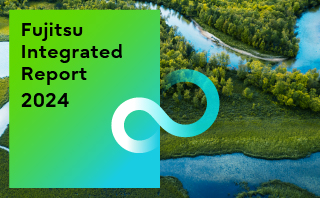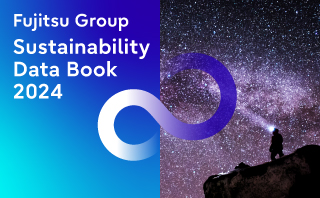-
Sustainability at Fujitsu Group
- Sustainability Management in the Fujitsu Group
- GRB(Global Responsible Business)Goals and Achievments for FY2022
- GRB(Global Responsible Business)Goals for FY2025
- Fujitsu's accessibility
- Stakeholder Engagement
- United Nations Global Compact
- SDG-related Activities in Fujitsu
- External Recognition and Awards
-
Global Responsible Business
- Environment
-
- Environmental Management
- The Fujitsu Group Environmental Vision on Climate Change
- Living in Harmony with Nature (Conservation of Biodiversity)
- Environmental Action Plan
- Environmental Data
- Environmental Communication
- Environmental Social Activities
- Disposal and Recycling of ICT products
- Environmental Considerations in ICT Products
- Governance
-
Data and Documents
- Fujitsu Group Sustainability Data Book 2024
- Social, Governance and Environmental data
- Independent Assurance Report

- GRI Standards / United Nations Global Compact (UNGC) principles Comparison Table
- SASB Standards Comparison Table
- Sustainability Information Disclosure Framework
- Link to regions responsible business reports
- Contact
- Sitemap
Environmental Policy
Since its founding in 1935, the Fujitsu Group has made environmental preservation one of the most important elements in its management, based on its philosophy of "manufacturing in harmony with nature." We have formulated the Fujitsu Group Environmental Policy to promote environmental management reflecting the distinct character of our businesses.
In 1992, when Agenda 21 (*1) was adopted at the Rio de Janeiro Global Summit, we established Fujitsu’s Commitment to the Environment. This was created in the mold of the Global Environment Charter, announced by the Japanese Federation of Economic Organizations in the previous year. In October 2002, when the Johannesburg Summit was held, and summit participants were debating how to execute Agenda 21 in a more effective way, we revised this Commitment to create a Fujitsu Group Environmental Policy. Our objective in this revision was to implement environmental management in a way that reflects the distinct character of the Fujitsu Group’s business, responding to more and more diverse problems where environmental management is increasingly vital.
We confirmed that no changes to this policy were necessary in April 2023.
- (*1)Agenda 21:
A concrete plan of action for sustainable development, to be carried out by various countries and international organizations. It involves programs to deal with environmental issues, including social and economic problems such as population, poverty and human settlement issues, as well as soil, forests, the atmosphere, desertification, agriculture, biodiversity, water, hazardous wastes and chemical materials.
Philosophy
The Fujitsu Group recognizes that global environmental protection is a vital business issue. By utilizing our technological expertise and creative talents in the ICT industry, we seek to contribute to the promotion of sustainable development. In addition, while observing all environmental regulations in our business operations, we are actively pursuing environmental protection activities on our own initiative. Through our individual and collective actions, we will continuously strive to safeguard a rich natural environment for future generations.
Principles
- We help customers and society reduce the environmental impact of their business activities and improve environmental efficiency with comprehensive services that include advanced technologies, ICT products and solutions.
- We proactively promote environmentally conscious business activities to help the environment and economy coexist harmoniously.
- We strive to reduce the environmental impact of our ICT products and solutions throughout their entire lifecycle. (*2)
- We are committed to conserving energy and natural resources, and practice the 3Rs approach (reduce, reuse and recycle) to create best-of-breed eco-friendly products and solutions.
- We seek to reduce risks to human health and the environment from the use of chemical substances and waste.
- We disclose environment-related information on our business activities, ICT products and solutions, and utilize the resulting feedbacks to critique ourselves in order to further improve our environmental programs.
- We encourage our employees to work on global environmental conservation such as tackling climate change and preservation of biodiversity through their business and civic activities to be role models in society.
Revised in April 2011
President
Fujitsu Limited
- (*2)The lifecycle includes "Procurement", "Distribution and Logistics", "Development and Manufacturing", "Usage", "Recycle and Management of Waste", etc. The stakeholders through the lifecycle represent "Suppliers", "Contractors", "Clients", "Business Partners" and so on.


